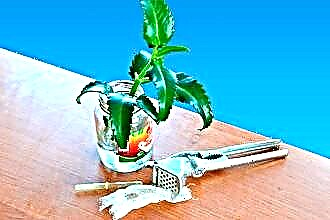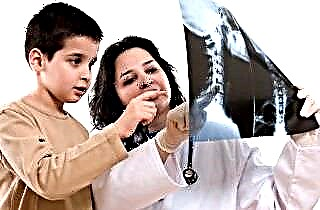The main factors causing the disease are external irritants, for example, inhalation of very cold air or contaminated with dust and chemicals, contact with the mucous membrane of pathogenic microorganisms (streptococcus, staphylococcus, influenza virus, fungal infection).
Pharyngitis can often occur as a complication after other diseases of the nasopharynx, such as chronic rhinitis, sinusitis, or as a result of dental diseases of the oral cavity.
Symptoms and diagnosis of the disease
The main symptoms of pharyngitis include:
- perspiration, dryness, redness of the mucous membrane in the throat;
- itching, burning in the nasopharynx;
- coughing;
- pain in the throat, ears;
- separation of viscous secretion;
- dry crusts on the throat;
- swollen lymph nodes;
- temperature increase.
Based on the above symptoms and visual examination, the specialist can make the correct diagnosis. Often in the process of the disease there is an infiltration of the posterior surface of the pharynx, as well as the palatopharyngeal arches. If the inflammation is localized on the lateral surface of the throat, then in this case there is swelling of the pharyngeal ridges, as well as redness of the mucous membrane at the site of inflammation.
Despite the fact that the symptoms of pharyngitis most often allow an accurate diagnosis, it is visually impossible to determine which infection caused the disease. After all, the treatment of pharyngitis in adults caused by a viral infection will differ significantly from therapy for a bacterial infection. To clarify the diagnosis, the following diagnostic methods are used:
- Pharyngospokia - examination of the inner surface of the throat with the help of special probes, which makes it possible to detect the presence of exudate or purulent plaque in the palate in the pharynx, which will indicate the presence of a bacterial infection.
- A complete blood count allows you to determine the number of lymphocytes and neutrophils. A significant increase in the former is characteristic of a viral infection, and of the latter, for a bacterial infection.
- Laryngoscopy is a way to visually assess the condition of the throat using a special device.
- Throat swab for bacterial culture in order to determine the type of pathogenic microorganism.
Treatment
Treatment of pharyngitis should primarily be based on the elimination of the factor that caused the disease. So, if the disease is caused by a virus, then antiviral drugs (Arbidol, Amizon, Groprinosin, interferon preparations) are used to treat pharyngitis. If the treatment was not started on time and there was a complication in the form of a bacterial infection, or the patient was faced with bacterial pharyngitis, in this case, antibacterial drugs for pharyngitis (Augmentin, Sumamed) should be taken. It is also necessary to exclude the influence of factors that aggravate the patient's condition: prolonged inhalation of contaminated air, stay in cold air (below minus 15 degrees).
Important! In the complex treatment of pharyngitis, it is necessary to completely exclude smoking, which has a detrimental effect on the entire body and the nasopharynx area.
With an uncomplicated acute course of the disease and exacerbation of chronic pharyngitis, it is often enough to direct treatment to eliminate unpleasant symptoms, adhere to a diet, use fortified food, exclude hypothermia, use warming compresses, inhalations, rinsing. Also, with a mild course of the disease caused by a bacterial infection, there is often no need for systemic use of antibiotics; it is usually sufficient to apply local antimicrobial therapy, for example, use sprays for pharyngitis.
Typically, such antibacterial drugs contain one or more active substances with an antiseptic effect. The most common are substances such as chlorhexidine, ambazon, thymol, iodine, alcohols, hexetidine, they are most often contained in drugs for pharyngitis (Faringosept, Hexoral). Also, honey preparations for pharyngitis often contain local anesthetics (lidocaine, menthol), essential oils (eucalyptus extract) and other substances. The antibacterial medicine can be produced as a spray, tablets, lozenges, gargle, or in a nebula for inhalation.
A topical antimicrobial agent used to treat pharyngitis must meet the following requirements:
 have a broad antimicrobial effect, exhibiting both antiviral and antibacterial activity;
have a broad antimicrobial effect, exhibiting both antiviral and antibacterial activity;- be non-toxic to the body and slowly penetrate from the surface of the mucous membranes;
- be hypoallergenic;
- do not irritate the pharyngeal mucosa.
Lozenges, lozenges, tablets, shown for pharyngitis (Septolet, Strepsils), have a rather low effectiveness, therefore, they are indicated exclusively in the complex treatment of the disease to reduce the severity of the main symptoms.
Medicines containing chlorhexidine (antiangin, sebidin) should be used with caution, following the instructions exactly.
With no less caution, you need to use drugs for the treatment of pharyngitis and sprays containing iodine (Jox), propolis (Proposol). If the doctor has prescribed a medicine or remedy for the treatment of pharyngitis based on these active substances, then before use, you must make sure that there is no allergic reaction and individual intolerance.
In the complex therapy of pharyngitis, various medications are used:
- The medical method for the treatment of pharyngitis often involves the use of a drug such as Bioparox, which has anti-inflammatory and antibacterial effects. This product is produced in the form of a metered dose inhalation aerosol. The spray has a high therapeutic efficiency, penetrating into the most inaccessible parts of the respiratory tract.
- A drug such as Imudon is also used for local treatment of pharyngitis. It has been proven that this agent is more effective in the treatment of various forms of the disease than traditional methods of treatment, for example, alkaline inhalation, antimicrobial agents or cauterization of granules. Imudon is available as a resorbable tablet. It can be combined with antimicrobial drugs, which significantly shortens the recovery time.
- Another effective drug in the treatment of pharyngitis is Hexoral. The medicine comes in many different forms and can be used as a throat spray or gargle. Unlike substances containing chlorhexidine, Hexoral has low toxicity and is active against a wide range of bacteria that cause pharyngitis. Also, the active substance contained in the preparation has a hemostatic and analgesic effect.
As medical practice shows, local antibacterial drugs are effective in the treatment of pharyngitis, while the choice in various situations is determined solely by the spectrum of individual antimicrobial activity of each of them.
Traditional methods of treatment
Traditional medicine knows ways to relieve the symptoms of pharyngitis, based mainly on the anti-inflammatory and analgesic properties of various plants. The most effective procedures are rinsing and inhalation.
- The simplest, but at the same time no less effective way of treating pharyngitis, is to rinse and rinse the nasopharynx with salt water. The rinsing procedure is carried out three to four times a day using a warm, freshly prepared solution (two teaspoons of table or sea salt per 200 ml of water). The same solution can be used to rinse the nasopharynx. The liquid is drawn in through the nose and spit out through the mouth, while the procedure has no restrictions on the number of repetitions per day and can even be carried out for the purpose of prophylaxis.
- In the complex treatment of pharyngitis, herbal baths have proven themselves well. For the procedure, add only a few drops (three to four drops) of eucalyptus oil to the bath or a liter of strong thyme herb infusion (two tablespoons per liter of water, aged for half an hour).
- Chewing on clove buds is also an effective way to relieve sore throat when treating any nasopharyngeal inflammation. You need to carry out such a procedure three to four times a day until complete recovery.
- If a medical examination shows that the pharyngitis is caused by a viral infection, antibiotics will be useless. To relieve symptoms and strengthen immunity in this situation, it is more advisable to use lozenges. You can cook them at home. For this, various herbs and spices are used, for example, echinacea, mint, eucalyptus, ginger, turmeric, anise or their essential oils. You can also add honey and other spices to taste. The substances that make up such a medicine help clear the mucous membrane of the throat from infection and increase the body's resistance.
- In the treatment of pharyngitis and other diseases of the nasopharynx, it is advisable to adhere to the optimal climatic conditions in the room where the patient is. It is important to maintain a sufficient level of humidity (at least 50%) and an air temperature of about 18-20 degrees. You can achieve the desired indicators by regularly ventilating the room and humidifying the air with a humidifier.
- It is also helpful to use a salt water spray that needs to be irrigated as often as possible to prevent drying out. Also, the use of a sufficient amount of liquid will help to moisturize the pharyngeal mucosa. To do this, you can use ordinary warm water, compotes, fruit drinks, decoctions of medicinal herbs (chamomile, sage, mint).

In the treatment of pharyngitis, carbonated, sour and cold drinks, as well as coffee, which has a diuretic effect, are contraindicated. It is necessary to exclude the use of milk drinks, which can cause excessive mucus production and intensify coughing.
- Warm, warming compresses on the throat area will help reduce pain and help drain mucus. To do this, you can use a regular woolen scarf wrapped around your neck, as well as a towel or napkin soaked in warm water. It is necessary to keep the compress until it cools down. After that, the procedure can be repeated again.
- Garlic is a natural antibiotic and antiseptic. It can be used both in pure form and as part of various medicinal mixtures. For example, you can use a product made from a tablespoon of grated horseradish, a teaspoon of honey, and a teaspoon of grated garlic. The resulting mixture should be dissolved in 200 ml of warm boiled water. The solution is taken orally in small sips or gargled with it.
- Steam inhalation has a high therapeutic effect in the treatment of pharyngitis. It is recommended to carry out four to six procedures per day, lasting at least five minutes. Various recipes are used as a solution for inhalation. For example, a decoction of pine cones (20 grams per glass of water) will be effective; infusion of leaves of coltsfoot (5 grams), mint leaves (1 gram) and string herb (3 grams) per glass of boiling water; infusion of lemon balm and mint herb (15 grams of dry herb per glass of boiling water).

 have a broad antimicrobial effect, exhibiting both antiviral and antibacterial activity;
have a broad antimicrobial effect, exhibiting both antiviral and antibacterial activity;

